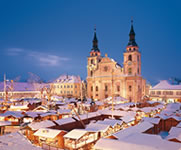Other highlights
Contact
Potsdam Tourismus Service der TMB Tourismus-Marketing Brandenburg GmbH
Am Neuen Markt 1
14467 Potsdam
Email:
[email protected]
Internet:
www.potsdamtourismus.de
Am Neuen Markt 1
14467 Potsdam
Email:
[email protected]
Internet:
www.potsdamtourismus.de
Museums

Gems from Babelsberg's 100 years of film history are preserved in the Potsdam Film Museum's collections section, along with brand new productions. Visitors can see examples of amateur cameras alongside professional equipment and find out about the pre-cinema era and the transition to video technology. A representative part of the technical collection can be viewed by prior arrangement and technical guided tours are available. The museum is open every day.
» Further information
The House of Brandenburg and Prussian History was opened in 2003 in the former royal coaching stables in the historical centre of Potsdam. It sees its role as a vibrant forum relating the history of the Brandenburg region. The permanent exhibition about the history and people of Brandenburg/Prussia is a fascinating journey through the 900 year history of the region. It provides a broad panorama of the history of its art and culture, including social history and everyday life. Around 350 original exhibits, photos, films and multimedia displays convey the eventful history of the region and its people. Closed on Mondays. Audio guide in several languages. Multilingual guided tours on request.
» www.hbpg.de
Located in a Dutch-style house built in 1733-40 in the heart of the Dutch quarter, this museum opened to the public in 1999. Its exhibitions cover the history of the city and its surrounding region. The collections include exhibits illustrating culture and everyday life from the 17th century to the 20th century, including furniture, glass, textiles, photos, militaria, posters, toys, tin figures, writing and printing, arts and crafts, sculptures, trades/technology, domestic objects, wrought-iron work, clocks, coins, insignia, badges, cards, engravings of Brandenburg, prints, drawings and paintings by Potsdam artists from the 18th to the 20th centuries. Closed on Mondays.
» www.potsdamtourismus.de
Sanssouci Palace, a world heritage site since 1990, is the most famous landmark in the city of Potsdam. One of Potsdam's best known Hohenzollern palaces, it was built in just two years, from 1745 to 1747, on the plateau above an existing vineyard. Georg Wenzeslaus von Knobelsdorff, the court architect to Friedrich II (1712-1786) supervised its construction. A huge flight of 132 steps sweeps between six vineyard terraces up to the palace which is one storey high and contains a total of twelve state rooms. Exquisite stucco decoration, panelling and magnificently furnished rooms make it one of the foremost interior creations of the 18th century. Frederick the Great enjoyed inviting scientists, philosophers, diplomats and artists to the Marble Hall. Open April to October, closed on Mondays.
» www.potsdamtourismus.de
Between the 17th and the early 20th centuries magnificent palaces and gardens were created in the royal cities of Berlin and Potsdam in Brandenburg/Prussia. They were added to the list of world heritage sites in 1990. The foundation maintains a number of unparalleled historical buildings in Berlin and Brandenburg, ranging from the famous palaces built for Prussian kings to historical mills. They include the palace, picture gallery and park at Sansoucci, New Chambers, the Chinese tea house, Sanssouci New Palace, Charlottenhof Palace, the Roman baths, the Orangery, Church of Peace, Marble Palace, Cecilienhof House, Caputh Palace, Rheinsberg Palace, Stern Hunting Lodge, Pomona Temple, the mosque and several other buildings. Open daily. Guided tours available on request.
» www.preussen.de
Opened in 2005, the Alexandrowka Museum presents the Russian Colony built in typical Russian style by architect Peter Joseph Lenné. One of Potsdam's UNESCO World Heritage sites, this fascinating legacy consists of 14 houses, an Orthodox Russian chapel and a 2,000m˛ reconstructed garden. The origins of the site date back to 1826/27, when it was built at the behest of the Prussian king, Friedrich Wilhelm III in honour of the Russian tsar, Alexander I (1777-1825). The little Russian village is dominated by log cabins richly decorated with wood carvings and ornamentation. Those wishing to learn more about the architecture and history of the settlement can visit the museum in house no. 2. Closed on Mondays.
» www.alexandrowka.de
Travel Planner
Select an option...
Map of Germany
Hotels in Potsdam
Loading



